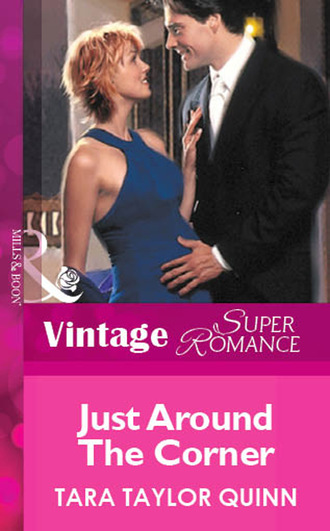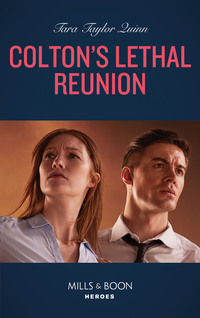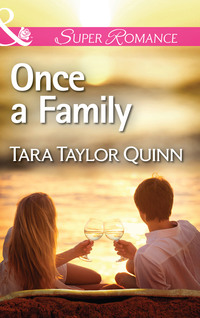
Полная версия
Just Around The Corner
“My family medical history,” he said, coming up with the idea at the last minute. “You should know my medical background. Your doctor should have it.”
“She did ask…” Phyllis said, and then stopped. Stopped speaking. Stopped walking. She looked up at Matt, her eyes serious, her lips firm.
“All right, one dinner, but that’s all,” she said. “And then I’m on my own.”
“Agreed.”
Matt meant what he said. But he didn’t feel good about it.
CHAPTER THREE
THINKING IT WOULD BE easier to talk if they weren’t facing each other across a table the entire time, Matt suggested he and Phyllis drive up to Tortilla Flat on Saturday, have a late lunch there, and then return to Shelter Valley. That gave them about five hours to reach some kind of accord.
And then get out of each other’s lives.
Phyllis surprised him by agreeing immediately to the date that wasn’t a date.
Things were awkward at first as she climbed into his Blazer late Saturday morning and they headed out. She was wearing a pair of designer-looking jeans and a thick black velour sweater that only accentuated the slimness of her small-boned frame.
It had been so long since he’d been out with anyone for any kind of social occasion that he’d more or less forgotten how to do it.
“It’s a little disturbing to think that we made a baby and know so little about each other, huh?” She broke the awkward silence, apparently reading his mind.
It was disconcerting how she always seemed to know just what to say to get him started. She’d done that in his office the day she’d come to tell him about the pregnancy. And then again on the phone. Hell, she’d probably done it that day they’d worked together in the Performing Arts Center; he’d just been too busy listening to his libido to hear.
He was going to be damn glad when this day was over and he could go back to being the only one privy to the thoughts of Matt Sheffield.
“So how long have you been a professor?” he asked, taking her comment as a cue.
“Eight years, though I didn’t start out with a full professorship.”
“You like it?” Matt turned the utility vehicle onto the highway that led to Phoenix and beyond.
“I love it,” she said, staring out at the road. He caught a glimpse of the smile on her face as he glanced over.
“Me, too,” he said. They had something in common. He didn’t know if that made the job ahead of them easier—or not.
She turned her head to look at him. “How long have you been teaching?”
This was why he avoided social occasions. And relationships. The questions inevitably led to places that were off-limits.
“Twelve years, on and off.”
“Always at a college level?”
He shook his head, reluctant to remember. “I started out teaching theater technology to junior-high and high-school students.”
“You said you’ve been teaching on and off. What did you do in the off parts?”
“Went to school, for one.” Matt ran his hand underneath the collar of his open black leather jacket. He wished he could shove a towel down his back to soak up the sweat collecting there. “Got my masters in theater technology with an emphasis on lighting design. I also graduated from a certificate program in videography.”
Relieved when there were no further questions, Matt concentrated on getting them through Phoenix and onto the two-lane, winding road that would take them up to Tortilla Flat. Apache Trail, as it had been dubbed more than a hundred years before, was at one time the only wagon trail going up to this part of northern Arizona. Tortilla Flat, though only ten miles up the mountain, was about a forty-five-minute drive. It had been the first stagecoach stopping place on the three-day journey from Phoenix to Roosevelt Dam.
The town, now more a tourist spot than anything, was reminiscent of those days, with most of the six or so buildings preserved in their original state. With its population of six, the town boasted a small store and ice-cream shop, a post office and well-known restaurant-cum-gift shop. The businesses were all run by the six-member family that resided there.
“I’ve never been up here.” Phyllis broke the silence that had fallen around them, a silence that seemed so persistent Matt had begun to wonder if they’d actually get around to discussing anything that day.
He’d almost convinced himself that he hoped not.
“This scenery is beautiful,” she continued.
Matt glanced around at the cacti and rocks, the dark greens and myriad shades of brown, the mountains rising above him on one side, the mile-long canyon on the other.
“I come up here fairly regularly,” he admitted. Especially when he was feeling his worst. The vast miles of deserted landscape always seemed to put things in perspective for him. Reminded him just how small he was—or just how big the picture.
She turned to look at him, making him uncomfortable. Somehow he’d let too much show again.
“So tell me about your family,” she said as he maneuvered slowly around the curves with their huge drop-offs only a foot away. There was no guardrail between them and those canyons.
Usually Matt liked the sense of danger he felt whenever he drove here. Today he was too aware of the woman beside him—and the baby growing inside her.
“Not much to tell,” he said eventually, shrugging, rubbing a sweaty hand along the leg of his jeans before returning it to the wheel.
“You said you had family history to give me,” she reminded him. “It’s why I’m here.”
He nodded. Took another curve. “Basically we were all healthy,” he said, trying to remember without thinking back.
“We?” she asked. She’d turned again, had drawn up one knee as she faced him. “How many of you were there?”
“Just my brother and sister and me. And my mother and father, of course.” You couldn’t forget them.
“No predisposition to any diseases that you know of? Nothing genetic we need to worry about?”
Matt froze. Nothing. At least not the kind of thing she was referring to. What she wasn’t asking and needed to know about was a different predisposition altogether—the tendency to get oneself thrown in jail that seemed to beset the male Sheffields. There were some basic values missing in the men of his family.
There was a time Matt had believed he’d been spared that particular curse. A time he’d convinced himself that if he did have it, he’d gotten the better of it, risen above it.
He’d been full of shit back then.
“My mother was anemic after she had me and my sister, but that was all.”
“Any cancer you’re aware of?”
“None.”
“Are they all still alive?”
How the hell did he answer that? Glancing over at her, Matt saw the warm interest in her intent green eyes—interest that, regardless of the magnificent scenery, was reserved for him.
It was inevitable that she’d find out. He owed her the chance to raise her kid right in spite of the strikes against him.
“I don’t know,” he said slowly.
He glanced over once more—in time to see the look of surprise that she quickly masked—and then he kept his eyes firmly on the hairpin turns in front of him. There was little traffic on the road, except for the occasional car approaching from the opposite direction.
And some motorcycles he could see in the distance behind him.
He waited for her to say something. For the questions to start. Nothing happened.
The turns kept coming. He continued, somehow, to stay on the road as he tackled them.
“My father died when I was in high school.” Murdered in prison because he’d accosted one too many of the new arrivals. He’d found one who’d managed to smuggle in a weapon.
“I’m sorry.”
She sounded so sincere he almost looked over at her again. But he knew better. Matt Sheffield needed sympathy—caring—from no one. That was his golden rule.
One that had served him well.
“Don’t be,” he said. There was no need for her to waste her sympathy. “We weren’t close.”
“You didn’t live together?”
“Off and on.”
“Your parents were divorced, then?”
“No.”
“You want to tell me about it?”
“No.”
“Do I need to know?”
Probably.
Another turn. And a car passing on the left. Matt slowed down from twenty miles an hour to a crawl.
“The first thing I remember about my father happened when I was about two. The cops came to our door and put handcuffs on him and hauled him away. He wasn’t back the next morning.”
He paused. Waited for her reaction—disgust, contempt, horror. Or maybe pity. The reactions, though varied in strength, were basically all the same.
Phyllis held hers in.
“That was only the first arrest. There were many more.” He paused. “I don’t know how old I was when I realized what my mom did while he was gone—the different men friends she ran around with, the bars. Trying to find forgetfulness, I guess.”
At least that was the justification he’d created for her. The one he could stomach.
“And love,” Phyllis said quietly.
“If that’s what she wanted, she wasn’t looking in the right places.”
“Not everyone is as smart as you.”
He replayed the words a couple of times, searching for the sarcasm. He found only open understanding. From a woman who didn’t know him at all.
A woman who’d spent only one day with him. A day that had resulted in irrevocable consequences. The baby. He couldn’t forget, even for a moment, about his most recent fall from grace.
“Every time my father went to jail, he was gone for a longer period. The last time, he never made it back home.”
“He died in prison.”
“Not from a disease. You don’t have to worry about that,” he assured her, coming up to a one-way bridge. He waited for the approaching car to go first. “He was murdered.”
Stepping lightly on the gas, Matt guided the Blazer over the bridge.
“And your mother?”
“She ran off with her boyfriend.”
“And abandoned you and your brother and sister?”
“Just me. My brother was…gone by then. And she took my sister. Lori was older than me, out of high school, and she and my mom were pals.”
“They just…left you?”
More turns. Matt negotiated them. “I was glad they did,” he told Phyllis. “I wasn’t living with them anymore, hadn’t been since I turned sixteen and got a job at the grocery store. I rented a one-bedroom apartment with my first paycheck.”
“At sixteen?” Her voice had lost its calm.
The warmth was still there. Matt didn’t get it.
“Who’d rent to a sixteen-year-old kid?”
“An old lady who’d taught him in the fourth grade and had a room over her garage.”
“Are you still in touch with her?”
He shook his head, slowing as he came to the second bridge. The way was free. He could go. “She died ten years ago.”
A happy woman. Her star pupil had still been shining.
It had been another year before he would’ve killed her with disappointment.
“And in all this time, you’ve never heard from either your mother or your sister?”
“Not a word.” They hadn’t actually been on speaking terms. Not after that last big fight when he was sixteen and he’d told them what he thought of them and the life they were living. When he’d denounced everything they stood for, refusing to have anything more to do with them.
He’d not only been incredibly young, he’d been foolish. He’d thought that if he distanced himself from his family, he’d lose the stigma of being related to them. He’d thought he’d stop paying for their choices, their actions.
But he’d been judged by his association with them just the same.
He understood that now. He was a Sheffield and he couldn’t escape his past.
But that wasn’t going to happen to his child. No child of his was going to be judged by his father’s sins. Or made to suffer for them.
If he was certain of nothing else in life, he was certain of that. He’d die before he’d allow another generation to be hurt by the stigma of criminal convictions and jail time. Of coming from losers. And going nowhere because of it.
“Did you have any other family? Aunts, uncles, ousins?”
Oh, yeah. “My dad’s younger brother.”
“He couldn’t take you in?”
“At the time he was serving ten years for auto theft….”
THE RESTAURANT WAS amazing. That was the only word Phyllis could think of—amazing. She stared, her eyes darting all over the room. It was a rustic old place, and she could easily believe it had been there for more than a hundred years. A good part of the building hadn’t been, Matt had told her, as it had burned in a fire in 1987. But some of the original structure still stood.
There was nothing fancy about the wooden tables and chairs crammed too close together, the cheap tablecloths. Yet it was perfect. They were seated immediately, which Matt said was fortunate since the restaurant didn’t take reservations.
At the moment, her stomach was cooperating. She didn’t feel even a twinge of the morning sickness that had been causing her such misery over the past few weeks.
“I’ve never seen so many dollar bills in my life,” she said for the third time. Since arriving at Tortilla Flat, all their conversation had centered on the restaurant. Every available inch of the inside walls were covered with bills, mostly American one-dollar bills, but other paper currency, as well. Some foreign. Even some checks.
Though she sensed that their conversation—their real conversation—was far from over, Phyllis was glad for the respite.
Matt had one hell of a lot of pain bottled up inside him. Phyllis hadn’t felt anything that potent in more than a year. Probably not since she’d first met Tory Sanders, struggling with grief for her sister and fear of her ex-husband. She knew that if the situation with Matt was different, if she’d met him at another time, in another way, if she hadn’t slept with him, she could probably have helped him.
She would’ve liked to try. Underneath all the keep-off signs, Matt Sheffield was an intelligent, gentle man. A kind man. At least judging how he’d been with her. And with his students during her symposium.
“People come here from all over the world and leave the money,” Matt said after their waiter had taken their drink order, imparted a bit of Tortilla Flat history and left. Matt indicated the newspapers the man had set in front of them.
“The rest of the history is right there, and the article on the second page is the menu.”
The place was crowded, with every one of the fifteen or so tables taken and people milling around in the gift shop just beyond.
“The bills all have names on them,” Phyllis said.
“Or business cards tacked to them.”
“How many of them do you think there are?”
“I wonder every time I come here, but I have no idea.”
“A million maybe?”
“I doubt it. But I know it was a lot more than anyone wanted to lose when the place burned in ’87.”
“The walls were covered like this back then, too?”
“More so, from what I’m told. I guess the bills were four and five thick in some places.”
He looked so comfortable sitting there, sipping from the iced tea the waiter had brought. The perfect host.
Phyllis could hardly believe this was the same man she’d known in Shelter Valley. Or the one she’d driven up with.
He’d shed his jacket, revealing his broad shoulders in the denim shirt he was wearing. It was tucked into another pair of the snug-fitting jeans that had driven Phyllis to insanity that fateful Saturday afternoon.
His black hair and eyes were just as captivating. And those hands, resting so easily on the table…
She guessed it was time they returned to the business at hand. Before she forgot that all it could ever be was business.
“So,” she said, leaning forward, hands folded on the table. “Back to medical history. Any allergies in your family?”
“None.”
“You aren’t allergic to any medications?”
“Not that I know of.”
She could do this. Breeze right through without ever really focusing on what was going on. Just get the information and process it later.
“What about blood type?”
“I have one.”
Startled, Phyllis brought back her wandering gaze to land on him. He was grinning. The effect was devastating.
Phyllis smiled back. “I assumed so. You wouldn’t happen to know what it is, would you?”
“B positive.”
She was A positive, which would be just fine.
And then she ran out of questions.
The waiter finally stopped at their table on one of his many trips past. They gave their lunch order. He was having a burger. She’d chosen the taco salad. After that she just sat. And pretended there weren’t a million things she wanted to know about him.
She could tell herself that she should ask them in order to safeguard her child’s future. But she didn’t. She was a psychologist; she knew those tricks.
She was familiar with the various and often complex rationalizations the mind devised, rationalizations that let you do what you wanted when you knew you shouldn’t. Focusing on the one reason it was all right to proceed while ignoring the four reasons it wasn’t.
Such rationalizations had caught her once—and trapped her.
She wasn’t going to be caught again.
Not by the mind’s devices. Not by her own devices. And not by being vulnerable to the whims of the male ego.
She’d finally gotten beyond the pain of her divorce. Faced reality. Left useless dreams behind. She’d moved to Shelter Valley and found happiness. She loved the town, her work, helping others. She loved the way people in Shelter Valley made her feel. She finally had a life full of true friends and the things that really mattered.
And she had a baby on the way. She couldn’t afford to threaten all of that by doing something foolish—like getting involved with a man who had no place in her new life.
CHAPTER FOUR
MATT HAD NO IDEA how he and Phyllis had ended up sitting on her front step as the afternoon waned. He’d walked her to her door after their trip, she’d asked a question about the presentation he’d helped her with earlier that semester—said she was hoping to have a video made of it for some of her peers who’d attended the symposium. One comment led to another and suddenly, almost an hour later, he became aware of himself sitting there, having a real give-and-take adult conversation for the first time in years.
They still hadn’t broached the reason he’d called this meeting. And he wasn’t sure how, exactly, he should bring up the subject.
“What about dating?” he suddenly blurted as her questions about lighting-design techniques finally dwindled.
“No!” she exclaimed, her shoulders straightening, bringing her breasts into relief against the black velour covering them. “We already agreed there’ll be no involvement between us,” she added with a little less agitation.
Matt could almost feel the effort it took her to appear unaffected. So the good doctor had secrets, too.
“I meant you dating,” he said slowly, wondering just what those secrets might be. “Not us.”
“Oh.” She paused, her shoulders relaxing as she wrapped her arms around her knees. “Well, not that it’s any business of yours, but I don’t.”
“Don’t date?” If he wasn’t so detached, he might’ve been shocked. “Ever?”
“Nope.”
“Why the hell not?”
She pierced him with a look he’d have been hard-pressed not to challenge in another life. “This may come as a surprise to you, but not every woman needs a man in her life to be happy.” Her eyes dared him to argue with her.
“No, I guess lesbians don’t.”
“I’m not a lesbian.”
“I’m fully aware of that.”
She blushed. Looked away.
Matt bit back a grin.
And then quickly sobered as he remembered he wasn’t there to enjoy himself.
“It occurred to me yesterday that this…situation we’ve created makes any relationship you are…or hope to be involved in…difficult. Romantically speaking.”
Smooth, Sheffield. Spit that one right out.
“No problem there.”
“Oh.” Matt nodded, waiting for the relief he was going to be feeling any second. “Good.”
What the hell did that mean—No problem there? That she was in a relationship—one that had moved beyond dating—and the man was willing to take on Matt’s baby? Or that she’d really been speaking of herself and not just hypothetically when she’d said a woman didn’t need a man in her life to be happy?
A family, all wearing helmets and gloves with their sweatshirts and jeans, rode by on bikes, two adult-size and two child-size, one with training wheels. Matt and Phyllis watched silently. He wondered if things were as perfect inside that family’s house as they appeared on the outside.
“So, you really doing okay?” he asked Phyllis as the family rode slowly around the corner and out of sight.
“I really am.”
“You’re sure?”
She turned to look at him, her soft green eyes filled with question. “I’m sure,” she told him. “Why do you find that so hard to believe?”
Matt shrugged, gazing out at the street. With his forearms resting on his knees, his black leather jacket open, allowing the evening chill to penetrate the thin cotton of his button-down shirt, he contemplated the wisdom of answering her question.
“I guess because I’m having a little trouble with things myself,” he finally said.
A quick sideways glance showed him her frown. Matt focused on the white minivan driving past. A thirty-something short-haired man was driving, a blond woman in the passenger seat. A not-too-tiny hand was plastered to one of the back windows facing them. He’d seen at least one car seat, as well. A family going out to dinner after work?
Or maybe to some kind of ball game? Had that hand in the back belonged to a boy? Was he an aspiring athlete? And if so, did he have any real talent, or were the next few years going to be a real struggle for him?
“What kind of problems are you having?” Phyllis’s question, which sounded almost reluctant, reminded Matt that he wasn’t sitting there alone. And shouldn’t, for the moment, be living vicariously.
“I wouldn’t call them problems,” he was quick to assure her. Nothing so complicated as a problem. “But I’m not an irresponsible man.”
“I never thought you were.”
He was glad to hear that. Not that it should matter.
“So, the fact that I’ve fathered a child and am doing absolutely nothing to take responsibility for it isn’t going down right with me.”
“But I’m not letting you do anything.”
“I know.”
“So the choice is out of your hands.”
He pinned her with a hard stare. “Is it?”
Rocking back and forth, her feet leaving the step, then gently touching again, Phyllis nodded. “Of course it is. It’s not as if there’s anything for you to do. Any role to play. We hardly know each other.”
“I’m the baby’s father.”
“He doesn’t know that.”
His stomach dropped. “It’s a boy?”
“I don’t know.” She glanced at him and then away. “That was a generic ‘he.”’
“Oh.” Good. For a second there, thinking the baby actually had a sex had made it all seem so much more real. So much more threatening.
He knew that made no sense. Of course the baby had a sex. Whether or not its unprepared parents knew what it was.
“The point is,” Phyllis said, still hugging her knees, still rocking slightly, “your involvement here is only biological. In the big picture, that doesn’t have to mean anything.”
Relief flooded through Matt, almost bringing forth the grin he’d suppressed earlier. Almost, but not quite. A strange, inexplicable sadness got in the way.
“I can’t just turn my back on this.”
“You have no choice.” She started to rock harder.
“There are always choices.” Some much harder to face than others.














